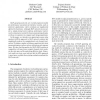Free Online Productivity Tools
i2Speak
i2Symbol
i2OCR
iTex2Img
iWeb2Print
iWeb2Shot
i2Type
iPdf2Split
iPdf2Merge
i2Bopomofo
i2Arabic
i2Style
i2Image
i2PDF
iLatex2Rtf
Sci2ools
97
Voted
DSN
2009
IEEE
2009
IEEE
MAP-AMVA: Approximate mean value analysis of bursty systems
MAP queueing networks are recently proposed models for performance assessment of enterprise systems, such as multi-tier applications, where workloads are significantly affected by burstiness. Although MAP networks do not admit a simple product-form solution, performance metrics can be estimated accurately by linear programming bounds, yet these are expensive to compute under large populations. In this paper, we introduce an approximate mean value analysis (AMVA) approach to MAP network solution that significantly reduces the computational cost of model evaluation. We define a number of balance equations that relate mean performance indices such as utilizations and response times. We show that the quality of a MAP-AMVA solution is competitive with much more complex bounds which evaluate the state space of the underlying Markov chain. Numerical results on stress cases indicate that the MVA approach is much more scalable than existing evaluation methods for MAP networks.1
Related Content
| Added | 20 May 2010 |
| Updated | 20 May 2010 |
| Type | Conference |
| Year | 2009 |
| Where | DSN |
| Authors | Giuliano Casale, Evgenia Smirni |
Comments (0)

